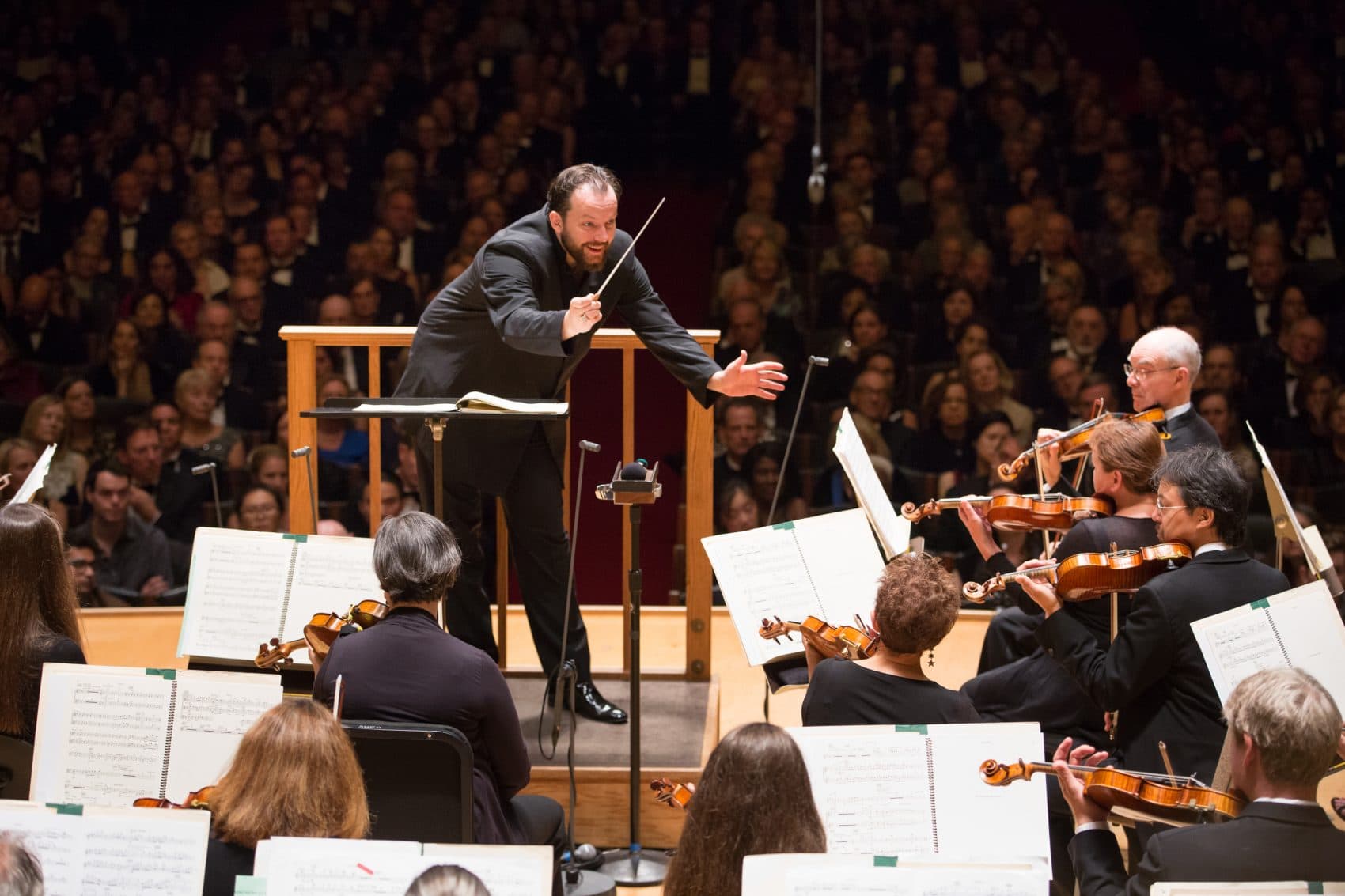Advertisement
Year In Arts And Culture
Andris Nelsons, Superstar — A Year In The Charmed Life Of The BSO Conductor

He and his wife are the Tom and Gisele of classical music.
His office is just a box to stand on: no walls, no doors, not even a chair. But when he’s done with his work on the podium, thousands of people rise up and cheer.
The life of Andris Nelsons is a heady experience. Famous? He’s that. Venerable organizations in Vienna, Leipzig, London and Boston eagerly vie for his time. He travels with a posse of hundreds, and performs in America, Europe and Asia. He makes millions.
He and his wife, soprano Kristine Opolais, have it even better than Tom and Gisele. Sometimes they work together. No 9 p.m. bedtime for these two. And likely no avocado ice cream either.
A year with the Boston Symphony Orchestra maestro includes industry awards, tours all over the globe, recordings of all kinds and concerts. Lots of concerts. Toss in some photo shoots, first pitches at Fenway Park, a rogue appearance as a trumpeter, and some toe-stubbing remarks about sexual harassment, and it will come as no surprise that our arms-akimbo maestro and his family will spend the holidays far away from it all, at his home in beloved Latvia.
Give the guy a rest.
Nelsons’ 2017 began typically enough, with concerts in England and in Dortmund, Germany — where he is artist-in-residence — and then in Boston. But a February announcement that his second Shostakovich recording on Deutsche Grammophon won a Grammy Award — just as last year’s initial recording did — soon added another layer of gilt to the conductor’s recording trophies.
If the record industry is dead, someone forgot to tell Nelsons. Deutsche Grammophon has him recording all the Shostakovich symphonies with the BSO. All the Beethoven symphonies with the Vienna Philharmonic. All the Bruckner symphonies with the Gewandhaus Orchestra. That’s about three dozen symphonies, if you’re counting.
The BSO has released Nelsons’ live performances of all the Brahms symphonies on its own label as well. Toss in the Strauss wind music (with Alexi Ogrintchouk and the Royal Concertgebouw, on BIS), piano concertos with Stephen Hough and the City of Birmingham Symphony on Hyperion, and some Puccini with Opolais on Orfeo — not to mention his inclusion on the $200 BSO box set, released just in time for your holiday shopping pleasure — and Nelsons might be singlehandedly keeping the classical music recording industry alive.
If the record industry is dead, someone forgot to tell Nelsons.
His concerts this year with the BSO were uniformly interesting. Some were phenomenal: A February world premiere — Gubaidulina’s Triple Concerto. Opening night at Tanglewood — conducting Mahler’s “Resurrection.” Opening night at Symphony Hall, in an all-Bernstein program. Bruckner 4, and the second Prokofiev violin concerto (with Leonidas Kavakos) during Thanksgiving week.
Nelsons led the BSO to Carnegie Hall, then Toronto and Montreal, in March, and later to Japan in November. He took the Vienna Philharmonic to China in October, after a short swing around Europe. The Asian tours — after China with Vienna, Nelsons stayed there till the BSO came to Japan — were filled with public appearances, open rehearsals, and high profile meetings. Nelsons seemed to relish building a another adoring audience.
Toss in podium appearances with his old City of Birmingham Orchestra, London’s Philharmonia Orchestra, Munich’s Bavarian State Opera, the Tanglewood Festival Orchestra, and somewhere around a thousand professional musicians have added “worked under Andris Nelsons” to their resumes.
For fun Nelsons threw out the first pitch at Fenway Park (a mile over the head of Jackie Bradley Jr.), took the BSO to Franklin Park for an outdoor adventure and played trumpet from the back of the stage at Tanglewood. Here’s his solo, performing “Malice Toward None,” from John Williams’ soundtrack to “Lincoln” (Williams conducting).
It wasn’t all applause for Nelsons in 2017. For someone who presumably can hear if the back desk in the viola section sounds sharp or flat, Nelsons’ remarks in November on Boston Public Radio, in the midst of swirling sexual abuse stories, were stunningly tone-deaf.
He seemed to sweep aside the possibility of abuse in the classical music field, with the notion that allegations were “artificially exaggerated,” and that music could make everyone a better human being. Those who know Nelsons attributed his remarks either to his excessive optimism, and genuine enthusiasm for the repertory, or to the language barrier — English being somewhere in the secondary tier of his expertise, behind Latvian and Russian. The BSO quickly clarified his position.
Those looking for irony in Nelsons’ remarks found it on the front pages only days later. His predecessor at the BSO, James Levine, soon faced a blizzard of charges stemming from incidents alleging his own sexual predation.
This wasn’t Nelsons’ only controversy of the season. He pulled out of a Metropolitan Opera production of “Tosca” without any real explanation. This “Tosca” was to feature Opolais in the title role — but she had pulled out too. (More irony: he was replaced at first by Levine, who was later fired because of the subsequent abuse accusations.)
But the accolades far outweighed the glitches. The Grammy in February was followed by Musical America’s Artist of the Year award in the fall; the Bruckner recording with Gewandhaus was given the Edison Klassiek Award; and the Gewandhaus Orchestra announced his first season under Nelsons (to begin in Feb. 2018).
It will mark a starry 275th anniversary for that orchestra, which has been led in the past by the likes of Mendelssohn, Fürtwangler, Bruno Walter and Kurt Masur and now will follow the baton of the 39-year-old Latvian. Coupled with his ongoing directorship in Boston — extended through 2022 — the Gewandhaus appointment means we’ll be sharing Nelsons with the world for quite some time.


